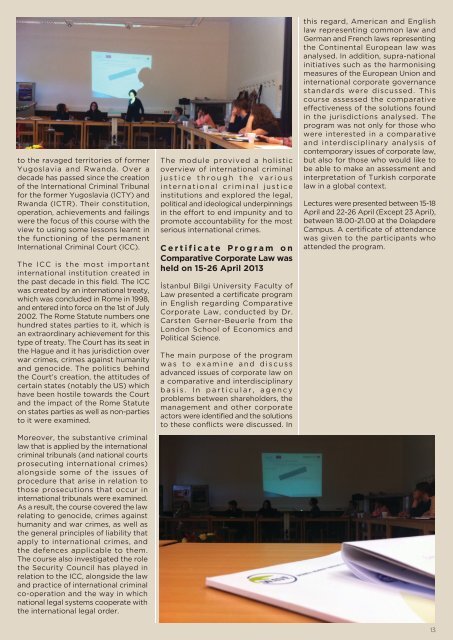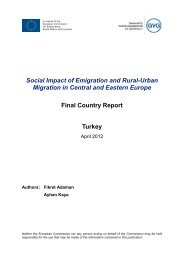NEWSLETTER - İstanbul Bilgi Üniversitesi | AB Enstitüsü
NEWSLETTER - İstanbul Bilgi Üniversitesi | AB Enstitüsü
NEWSLETTER - İstanbul Bilgi Üniversitesi | AB Enstitüsü
You also want an ePaper? Increase the reach of your titles
YUMPU automatically turns print PDFs into web optimized ePapers that Google loves.
to the ravaged territories of former<br />
Yugoslavia and Rwanda. Over a<br />
decade has passed since the creation<br />
of the International Criminal Tribunal<br />
for the former Yugoslavia (ICTY) and<br />
Rwanda (ICTR). Their constitution,<br />
operation, achievements and failings<br />
were the focus of this course with the<br />
view to using some lessons learnt in<br />
the functioning of the permanent<br />
International Criminal Court (ICC).<br />
The ICC is the most important<br />
international institution created in<br />
the past decade in this field. The ICC<br />
was created by an international treaty,<br />
which was concluded in Rome in 1998,<br />
and entered into force on the 1st of July<br />
2002. The Rome Statute numbers one<br />
hundred states parties to it, which is<br />
an extraordinary achievement for this<br />
type of treaty. The Court has its seat in<br />
the Hague and it has jurisdiction over<br />
war crimes, crimes against humanity<br />
and genocide. The politics behind<br />
the Court’s creation, the attitudes of<br />
certain states (notably the US) which<br />
have been hostile towards the Court<br />
and the impact of the Rome Statute<br />
on states parties as well as non-parties<br />
to it were examined.<br />
Moreover, the substantive criminal<br />
law that is applied by the international<br />
criminal tribunals (and national courts<br />
prosecuting international crimes)<br />
alongside some of the issues of<br />
procedure that arise in relation to<br />
those prosecutions that occur in<br />
international tribunals were examined.<br />
As a result, the course covered the law<br />
relating to genocide, crimes against<br />
humanity and war crimes, as well as<br />
the general principles of liability that<br />
apply to international crimes, and<br />
the defences applicable to them.<br />
The course also investigated the role<br />
the Security Council has played in<br />
relation to the ICC, alongside the law<br />
and practice of international criminal<br />
co-operation and the way in which<br />
national legal systems cooperate with<br />
the international legal order.<br />
The module provived a holistic<br />
overview of international criminal<br />
justice through the various<br />
international criminal justice<br />
institutions and explored the legal,<br />
political and ideological underpinnings<br />
in the effort to end impunity and to<br />
promote accountability for the most<br />
serious international crimes.<br />
Certificate Program on<br />
Comparative Corporate Law was<br />
held on 15-26 April 2013<br />
<strong>İstanbul</strong> <strong>Bilgi</strong> University Faculty of<br />
Law presented a certificate program<br />
in English regarding Comparative<br />
Corporate Law, conducted by Dr.<br />
Carsten Gerner-Beuerle from the<br />
London School of Economics and<br />
Political Science.<br />
The main purpose of the program<br />
was to examine and discuss<br />
advanced issues of corporate law on<br />
a comparative and interdisciplinary<br />
basis. In particular, agency<br />
problems between shareholders, the<br />
management and other corporate<br />
actors were identified and the solutions<br />
to these conflicts were discussed. In<br />
this regard, American and English<br />
law representing common law and<br />
German and French laws representing<br />
the Continental European law was<br />
analysed. In addition, supra-national<br />
initiatives such as the harmonising<br />
measures of the European Union and<br />
international corporate governance<br />
standards were discussed. This<br />
course assessed the comparative<br />
effectiveness of the solutions found<br />
in the jurisdictions analysed. The<br />
program was not only for those who<br />
were interested in a comparative<br />
and interdisciplinary analysis of<br />
contemporary issues of corporate law,<br />
but also for those who would like to<br />
be able to make an assessment and<br />
interpretation of Turkish corporate<br />
law in a global context.<br />
Lectures were presented between 15-18<br />
April and 22-26 April (Except 23 April),<br />
between 18.00-21.00 at the Dolapdere<br />
Campus. A certificate of attendance<br />
was given to the participants who<br />
attended the program.<br />
13



